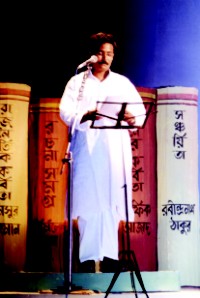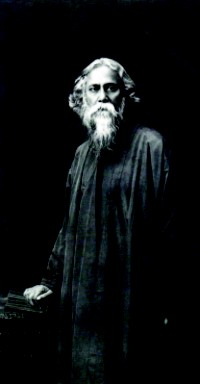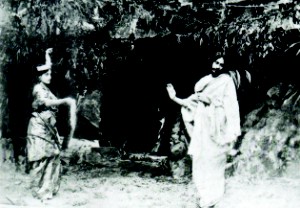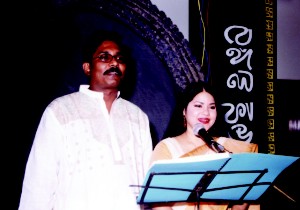| Home - Back Issues - The Team - Contact Us |
 |
| Volume 10 |Issue 24 | June 24, 2011 | |
|
|
Literature Reciting Tagore Fayza Haq
Hassan Arif and Laila Afroze are familiar faces on TV and well-loved recitation experts. One is a culture activist and the other a senior banker. Both are extremely well-read about world literature. For them Rabindranath Tagore is a name they have grown up with – such is their cultural background. Books, films, paintings, theatre, music and dancing – these are integral elements of their everyday existence. Arif and Laila have performed solo and as a duo, in Dhaka, and in the distant districts of Bangladesh. Their personalities and experience of handling speech delivery has helped the common person, as well as those well-read in the field of literature to enjoy the treasure trove that Rabindranath has left for us. Reading aloud from books have been popular through the years. Book reading is also being popularised by cultural groups here in Dhaka, such as at the Alliance Francaise, led by Dr Niaz Zaman; and Luva Naheed of Bengal Gallery – where one has heard Hassan Arif at the Public Library. Listening to “Chhinnopotro” and “Gitanjali” being read is like listening to the sound of river waves, or chirping birds on trees and on the bushes of “Chitrak” and “Shilpangan”, here in the cement jungle of Dhaka– where it is difficult to find parks and oxygen breathing openings of rivers and hillsides. One's interest in Rabindranath is revived by Laila's constant practice of recitation from “Gitanjali” (English), and recalling her mother- in-law Rowshan's passion of Kolkata where Rabindranath was often discussed and recited, during the bard's 150th birthday week; (Rowshan's copy of “Gitanjali” was, incidentally, chewn up by rats in her office and so the rats were dubbed 'literary' by onlookers; and this became subject of comic relief in one friends' circle). Laila and Arif are due for a duo at the Public Library, on passages of Rabindranath; and Laila wanted her accent to be impeccable, and recited for hours.
What is there in Rabindranath's poetry that people admire so much? This includes characterisation; portrayal of happiness, sorrow, betrayal, disappointments and other realities of life – in legends and everyday mundane incidents. The ordinary moments were made as real as in Shakespeare or Dickens. No European opera or musical of the US origin can surpass the dance-dramas by the Bard of Bengal. Films based on Rabindranth's works such as “Kabuliwallah” are as moving as in parallel item made in the west. People and places remain immortalised, as in Tolstoy's “War and Peace” or Margaret Mitchell's “Gone with the Wind”. The way in which the poet-playwright does it – i.e. the rhythm of the speech, and the depth of feelings that he creates in us, when we read the books or watch the plays, has us mesmerised as any other piece of literature of world renown. Laila Afroze says, “The lives of Bengalis is incomplete without Rabindranath. We have to go back to him in important moments in our lives. Emotional times, where in personal or countrywide level whenever there is unrest and sorrow we fall back on him. Even during the liberation war and before, the bard has given us courage and inspired us to go with the struggle of the revolution. He has given us the power to fight and win in our fight for democracy. Moments of joy and sorrow are best expressed in the poet's songs and writings. We did not have an alternate word to express ourselves in a more befitting manner. We borrow from Rabindranath, wherever necessary. All that we need to say have been told in his songs and poems. “Amaro porano jaha chaey tumi tai” or “Amar shokol dukher prodeep jele korbo nibedon”, says a man or woman, when in love or in offering to God. Nothing could be more expressive or more adequate. “O amar desher mati tomar porey thekai matha” or “Nai nai, bhoey hobay hobay joi” and “Amar shonar Bangla, ami tomaey bhalobashi” are among the innumerable patriotic songs by the poet of epar-opar Bangla. Hence Rabindranath has inspired us over the years. In my view he was a great personality and icon." “Bangabandhu has given a country of our own. Rabindranath has given us a language of our own. Even the national anthem is by him. The poet has given us not just a language but a usable everyday language. Before him the writers were bookish. It is not colloquial language. This is the metropolitan language in which we can express our feelings and thoughts. It is beyond what litterateurs before him, like Michael Modhushudan Datta or Bonkimchandra Chatttopadhya, have done for us. The bard went beyond the territory of books only. He went beyond the fixation for polished Bangla like 'koriachhi' and 'khaiachhi', or 'ami eta diye eshechhi'. The Bard of all times wrote with such vigour that words pulsate with feelings, desire and hope. His language is alive and immortal – through his poems and prose. It is 150 years since he was alive. Yet the child, or lover of today speaks in the language of Rabindranath."
Citing an example, Laila says "poets who followed like Jibanananda Das and Budhodev Bose, Amia Chakraborty and Samar Sen said that he was not a “adhunik” poet. Rabindranath wrote 'Shesher Kobita' to defend his brand of language by asking and explaining what the term 'adhunik' really was, in Laila's opinion, in Bangla literature, there is nothing more moving or romantic. In the poem 'Ami' the poet says, 'Amar chetonar ronger panna holo shobuj, chuni ranga hoey akashey joley uthlo alo, golaper digey cheye bollum shundor holo shey, ami jodi adhunik na hobo, to ki bhabey hobe'. Thus the poet stresses on himself as did the Romantic poets of the past, in England, had similarly established the importance of being a person and individual. Without man giving it recognition, the rose would have remained a part of nature and the emerald a mere part of the soil, says the poet. And so man urges others to look at life around and admire it. It is 'adhunik manush', his inner strength and beauty which distinguishes the poet, says the poet-playwright. The poet has not only written songs and poems, he is a playwright and commentator on our socio-economic life. In his novels like 'Chokher Bali' and 'Gora' and short story like 'Kabuliwalla' he depicts and comments on society around him. He happens to be a painter and an initiator of the micro-credit system as well – he was such a many faceted, gifted person. Standing on the land of which is Bangladesh today – we are moved by his writings, even after 150 years of his existence. Citing from the translation of 'Gitanjali”, which brought Rabindranath his Nobel Prize, Laila quotes: “Art thou abroad on this stormy night I have no sleep tonight. Ever and again I open my door There are thousands of lines from his immortal songs like The onomatopoeia, alliteration and assonance in these lines remain uniquely moving. As also in “Moner mondirey” the imagery remains unsurpassable bringing mankind and nature closer. When Rabindranath stayed in Bangladesh, he wrote some letters, which collectively, is known as 'Chinnopatra', says Hassan Arif, famed for his recitation forte, having appeared at the Public Library – on an hour-long non-stop session and at “Bengal Gallery”. He has been to many districts of Bangladesh, and is repeatedly seen on Bangladeshi TV channels.
“They were mostly addressed to the bard's niece, Indira Devi, and others to the workers on his 'zamindari'. These were collected by Rabindranath, and edited, then printed. In the letters were description of nature as found in Bangladesh with its flat land masses and the condition of people who lived on the plain land. The poet recalled his life in Kolkata and compared the tranquil, leisurely existence in places like Shelaideha and Shahzadpur. He remarked on everything beginning with the sunrise and the lifestyle of the people of the place which he termed as 'Bangladesh'. To me, it appears that it is Rabindranath's Bangladesh, which we have obtained." “Our geographic conditions, our landscapes have been discussed in depth. The poet has said that the flat land is the specialty of Bangladesh. He has talked about the rivers and acres of paddy fields – which to him have appeared unique. He had also observed the people here and described them in minute details. He has dealt with the moments of happiness and sorrow of the people here. He has portrayed the helplessness of the inhabitants who were seen as struggling against odds of nature. When he described the people and places like Shahzadpur – he brought the women and their lifestyle, crossing paths and acres of fields. " “One would like to add,” says Arif, "that the money Rabindranath got from his Nobel Prize was spent on the people of this part of Bengal."
Copyright
(R) thedailystar.net 2011 |
||||||||



